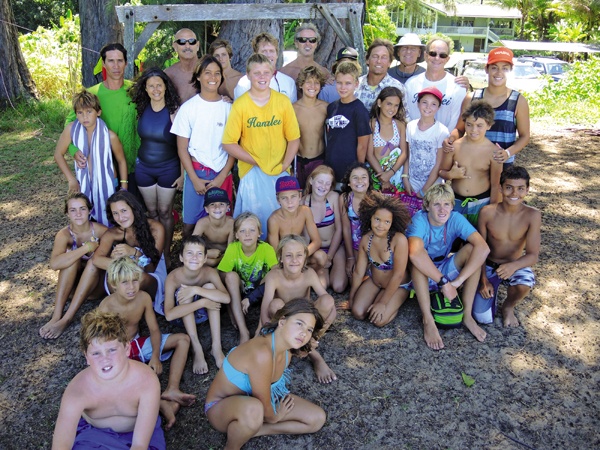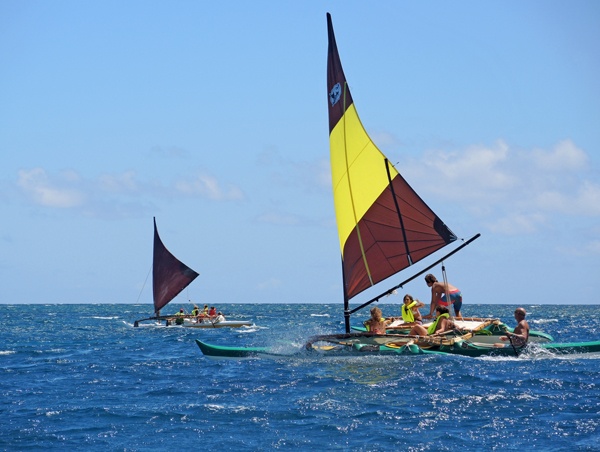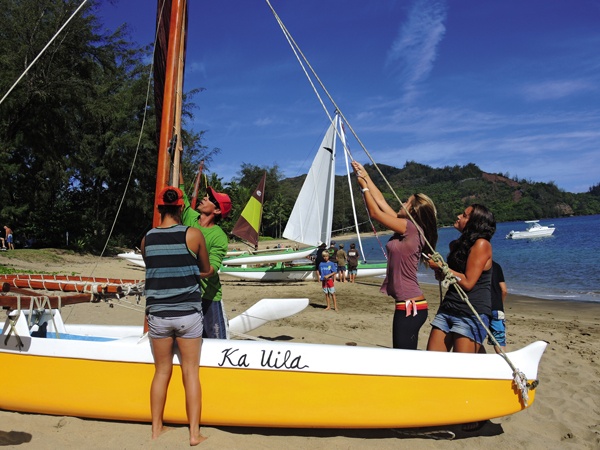Give food to a hungry man and he will be fed for a day, but teach him how to farm, fish or hunt and he will be fed for a lifetime. Akamai Learning school in Waipa is all about that
Give food to a hungry man and he will be fed for a day, but teach him how to farm, fish or hunt and he will be fed for a lifetime.
Akamai Learning school in Waipa is all about that and more. It weaves classroom teaching with Hawaiian cultural and sustainable practices.
“Hands-on learning helps the student to experience the ‘why’ and ‘when’ of applying science and math,” said Felicia Cowden, founder and director of Akamai Learning.
Her sort-of-unconventional school stimulates students to talk and write about what they have grasped while hiking, swimming, sailing and going on other adventures.
“Adventure-based learning teaches practical skills that are immediately relevant to the emerging and young teen,” said Cowden, who, along with Kapule Torio, Lorilani Torio and Hayley Ham Young-Giorgio make up the school’s core team of teachers.
To Cowden, it’s akamai — smart or commons sense — to take students on field trips to understand relationships between modern and natural worlds, subjects studied and the responsibility of building a resilient future.
Since the beginning of this school year, 27 students from the fifth to eighth grade have been learning about the traditional Hawaiian ahupuaa.
In the old days, the islands were divided into several ahupuaa, which resembled pie slices extending from the mountainous center of the island to the ocean’s edge. Communities within these ahupuaa worked and traded food and goods to be sustainable.
“The cultural wisdom of the Hawaiians teaches the students the core skills for happy survival and how we can regain healthy stewardship of the land for a bright future of less dependence,” Cowden said. “Together, they teach competence.”
Akamai Learning recently taught the role of fishing canoes in the lives of Hawaiian people, when the ahupuaa system was still active.
Parents and extended ohana Dave Beck, Hobie Beck, Nick Beck, Bob Kaden and Steve Long brought five sailing canoes to Waipa, and from there, they took students and teachers on a nearly two-hour sailing trip within and beyond Hanalei Bay. Parent Mitch McPeek took out his power catamaran as an escort boat.
Following the trip, Kapule Torio and Marj Milbrand of the Waipa Foundation organized everyone in a circle and students shared what they learned, including proper hand signs in the ocean, fishing skills, safety procedures, leadership, organization, cooperation, sailing over waves and on rough seas and using the wind to control the speed of a sailing canoe.
Last week, Ron Finley, of Los Angeles spoke to Akamai students about the importance of growing their own food. Also known as the “guerilla gardener,” Finley became famous after growing food — and being fined for it — in the streets of South Los Angeles.
Since then, Finley has spread his vision with the world, and is a motivational speaker.
Cowden said Finley toured the school, ate fish caught by the students and produce grown in Waipa, and students took him out on a double-hulled canoe in Hanalei Bay.
“We had an idea exchange,” said Cowden, adding that his group was thinking about sending children from Los Angeles to Kauai to spend some time at Akamai.
This past week, the famous Hokulea and her sister canoe, the Hikianalia, were docked at Hanalei Pier. On Wednesday, Akamai students learned from its crew, before the double-hulled, twin-masted Hawaiian voyaging canoes were scheduled to set sail to Nihoa and Papahanaumokuakea in the Northwestern Hawaiian Islands.
For the future, the school is planning a sailing trip down Na Pali Coast to Nualolo Kai, to continue learning about the ahupuaa system.
Akamai Learning moved this year from Kilauea to a 1,600-acre property at Waipa owned by Kamehameha Schools and managed by the Waipa Foundation, a Hawaiian cultural learning center.
Kamehameha Schools recently funded a new building at Waipa, which will be used by the foundation and Akamai Learning and available to the public as a community resource.
But the building still needs to be furnished to accommodate the school. Akamai Learning is hoping to fundraise $5,000 to purchase a computer, other communication equipment and classroom furniture.
“An investment in furnishing the building is an investment in the whole community,” Cowden said.
Once the building is furnished, Cowden said students will be able to mix nature-based learning with modern technology and develop their ability to self-educate and create.




